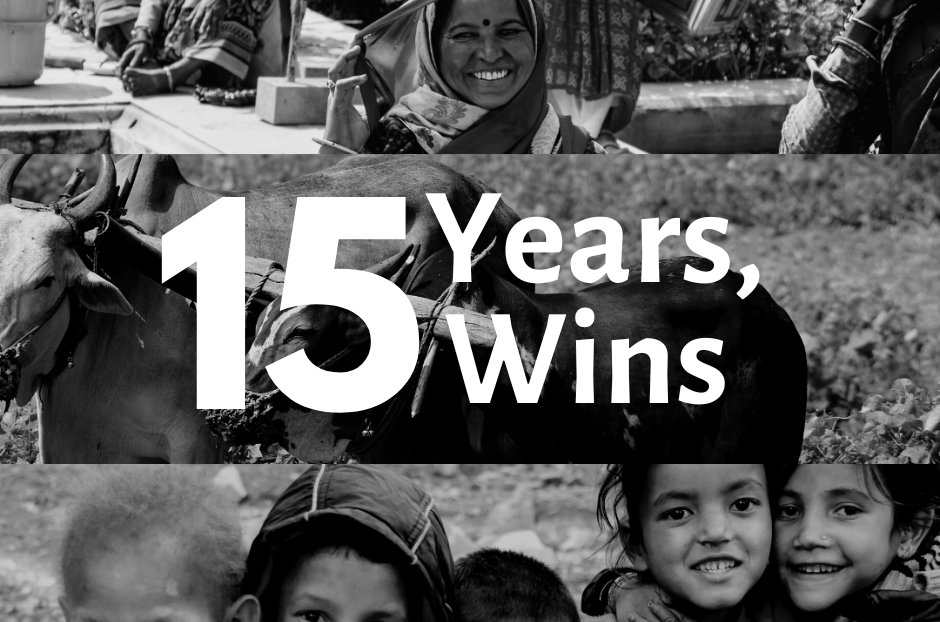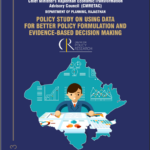
15 years of Accountability Initiative, 15 wins
30 June 2023
The Accountability Initiative was founded in 2008 as a research group which would unpack tough questions on the welfare system in India by way of rigorous evidence-building. Over the years, we have established ourselves through not only publishing credible research, but also how this research can be purposefully used by practitioners.
We are a product of our times. The mid-2000s were a period of greater citizen participation in governance. Demands for governmental transparency and accountability were amplified through movements such as the Right to Information (RTI). The RTI movement ultimately led to a law being passed, which was a substantial win for citizens. As our understanding of governance and decision-making grew, we realised that for government systems to be able to respond to citizen needs, working with governments and citizens alike to develop a deeper understanding of process related bottlenecks in service delivery and building capacity to find solutions was critical.
We thus widened our vision to building Responsive Governance or a government system that is agile and has the capacity to respond to citizen needs. To be comprehensive, our work grew from research to also include practice, beyond how traditional think tanks have operated, and building a linkage that is now bearing fruits.
As we celebrate 15 years of our existence, here is a lookback on what we are proud of having achieved in this time.
1. Budget Briefs are an established feature now, informing 800+ Members of Parliament, decision-takers within the government annually on how the government utilised its money to deliver welfare programmes. The briefs look at allocations, releases, expenditures, outputs and outcomes of key welfare schemes on health, nutrition, education, child protection, rural development, livelihood, water, sanitation and housing. The briefs have also provided a window into changing government priorities and provide a good look back at how welfare delivery has evolved in India.
2. Our Planning, Allocations and Expenditures, Institutions Studies in Accountability (PAISA) has emerged as the largest citizen-led process tracking methodology in the country. PAISA surveys have unpacked the little understood aspect of governance by tracking processes such as planning, budgeting and decision-making structures of the government to identify how welfare programmes are delivered on the ground. Using PAISA, we have studied the flow of money from the Union level down to the firstmile be it in households, schools, Anganwadi centres, Rural Local Bodies or districts in Bihar, Chhattisgarh, Madhya Pradesh, Maharashtra, Himachal Pradesh and Rajasthan. By extensively analysing the district as a unit of administration since our inception we have in due time created a repository of knowledge on the administrative structure of a district office, its linkages and convergence with other departments and fund flows thus bolstering India’s aspiration of developing model districts.
These studies have informed various state governments on persistent challenges and bottlenecks.
3. We have prided ourselves in an ‘ears to the ground’ approach. Our on-ground knowledge was utilised in 2016 wherein the School Management Committee (SMC) Manual created in Rajasthan featured inputs by our staff and a module on public finance which explained in simple-to-understand language, the grants given to schools. SMC members are essential to citizen monitoring of government school education. This manual was used to train SMC members throughout the state.
In 2018, the NCERT adopted our suggestions on communicating the National Achievement Survey (NAS) results at the state and district levels. The NAS is critical to understanding the status and learning outcomes of school children. NAS findings are communicated to all levels of the government, and are important in planning, monitoring, and course correction.
4. PAISA Dialogues: Engaging with district and state level officials by sharing insights and knowledge from our PAISA tracking studies to support their decision-making and policy implementation. For instance, in Rajasthan, our field staff presented findings from a study on the Integrated Child Development Services (ICDS) scheme to the state Director of ICDS, the Deputy Director and the Financial Advisor. They shared information on blockages of fund flows in different districts, which led to the Director and Finance Advisor ordering a deeper investigation into the matter, and finding ways to ensure effective transfers. Through the PAISA Dialogues we shared insights and knowledge from our flagship PAISA process tracking survey with district and state level officials to support their decision-making and policy implementation.
5. Policy research forms our core. What is the reality of fund flows to Panchayats in India? Examining the true status of decentralisation in the country and the estimated costs required for panchayats to effectively undertake their activities, we supported the 14th Finance Commission by studying the structure of devolution of powers, responsibilities and required versus actual finances available to rural local bodies (RLBs). The study covered all decentralisation models, namely, the panchayat system, the extension of the panchayat system to the 5th Scheduled Areas, Autonomous District Councils under the Sixth Schedule and other state specific arrangements. The report contributed to the Finance Commission making recommendations on increasing the amounts allocated to local governments from the divisible pool of taxes available with the Government of India.
6. Transparency and the availability of reliable, regular data for both government and citizens has been critical to our mission. Over the years e-governance has received a major policy push. In order to increase transparency and the quality of government data, we have actively worked with various departments and ministries to better their Management Information Systems (MIS) used to track the progress made in welfare programmes. They include the Central Plan Scheme Monitoring System (CPSMS) now known as the Public Finance Management System (PFMS), Swachh Bharat Mission MIS of the Ministry of Drinking Water and Sanitation, Sarva Shiksha Abhiyan MIS under the Ministry of HRD, the Public Portal of the MGNREGS, National Data and Analytics Platform (NDAP), and also provided inputs on the Jan Soochna Portal in Rajasthan.
7. We have trained public officials at various levels and lawmakers (Members of Legislative Assemblies) on the intricacies of public finance, governance structures and processes, including women Panchayati Raj Institution members and bureaucrats in government departments. The public officials have included those from the National Audit and Accounts Academy, Comptroller and Auditor General, Indian Economic Services, and early-career IAS officers training at LBSNAA.
8. Engaging champions of change has been core to what we do. We’ve occupied a space few research groups have by launching curated learning programmes drawn from our research. For instance, our Understanding State Capabilities course is informing the next generation of public policy practitioners and leaders. Through an experiential learning curriculum, the USC aims to build a strong foundation in public administration, public finance and social accountability theory linked to realities on the ground. Our participants have included students of policy schools such as ISDM and FLAME University as well as staff of NGOs. We got into institutional partnerships with premier social impact organisations such as Mantra4Change, Pratham and UChicago.
The Understanding State Capabilities course has played a critical role in helping early career public policy professionals to build an understanding on state capability challenges. One of our students has shared the following thought about the course:
“The course has been designed in such a way that someone who does not even have a background in political science can also pursue it without any difficulty. The course has helped me in understanding federalism, public finances, bureaucracy and social accountability in a better manner. During my time as a LAMP Fellow, the learnings helped me in the better drafting of policy and planning related suggestions.”- Monu Kumar, LAMP Fellow 2021-22
9. Our second course, Hum Aur Hamaari Sarkaar demystifies complex governance structures for grassroots leaders in India’s states.This financial year we conducted the Hum Aur Hamaari Sarkaar open courses in Bhopal, Patna, Jaipur and Udaipur. Through the course, we have been equipping changemakers with the knowledge and skills to navigate governance ecosystems effectively. For instance, in the COVID-19 pandemic, a course participant identified that their Panchayat had received money to spray disinfectants, but it had not done anything. The participant used what he had learnt about the public administrative structure at the local level, identified the right official to complain to, and approached the District Magistrate while also making use of a helpline number. This pressurised the Panchayat to spend the money as directed.
Devansh Pandey was part of the Hum Aur Hamaari Sarkaar cohort in Udaipur. He has this to say about the course:
“During the workshop I learnt a lot about decentralisation, public finance and e-governance. As a social worker, these topics are very important for me to learn. I am confident that I can use some of these concepts in the field in future”.
In all, we have trained more than 1,500 professionals over half a decade across all our learning programmes.
10. In the space of one-and-half decades we have had the opportunity to also work with various state governments on multiple projects. These include the governments of Chhattisgarh, Uttar Pradesh, Meghalaya, Andhra Pradesh, Karnataka and Rajasthan. The trust they have placed in us as a research group has led to the identification of bottlenecks within the government systems, whether they be linked to fund flows, processes, or people.
11. Working closely with the Technical Support Unit (TSU) set up under the National Health Mission (NHM) in Uttar Pradesh, we aimed to understand the reasons for low utilisation of health expenditure and diagnose bottlenecks in the implementation of government health interventions. The recommendations led to fine tuning of systems and processes and the analysis became an important tool for preparation of next year’s Project Implementation Plan (PIP).
12. Between 2021-2022, we prepared the first ever excel based dashboard on budget and expenditure for the State of Meghalaya to enable it to undertake real time tracking of receipts and expenditures and prepare projections for the following budget cycle.
13. In 2022, we assisted the Government of Meghalaya in the production of the state’s first Gender and Youth Budget. Our role was to study the landscape, bottlenecks to achieving gender parity, and ensure greater gender and youth equity in government spending in the state. Our team played a key role in preparing and disseminating these important policy documents/budget statements in their 2022 Budget.
14. In 2018, we launched a first-of-its-kind website for development practitioners with resources on governance in Hindi. The Hum Aur Humaari Sarkaar website has emerged as a popular source for them to learn about each other’s field experiences, trends from Accountability Initiative’s research, and the learnings of government functionaries and officials in the states.
15. We anchor a one-of-its-kind community of practice called the PULSE (Platform to Understand, Learn, Share and Exchange) for Development for the cross-pollination of knowledge and insights of development practitioners within India. Launched in 2020, PULSE for Development counts more than 98 development organisations as members, and over 170 individual members, who also include IAS officers. The platform is set to grow in 2023, and retrain focus from the COVID-19 pandemic to longstanding development challenges and India’s achievement of the Sustainable Development Goals.





